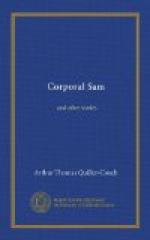He closed the outer door and, taking me gently by the elbow, half-supported me up the stairway, which was little better than a ladder, and led direct to the strangest room I have ever set eyes on.
It was circular—in diameter perhaps twelve feet—with a high conical roof. The roof had an inner lining of wood, and through a hole in it—where a panel had been slid back—a large optic-glass, raised on a pivot-stand, thrust its nose out into the night. Close within the door stood an oaken press, and beside it, on a tripod, a brazier filled with charcoal and glowing. A truckle-bed, a chair, and two benches made up the rest of the furniture: and of the benches one was crowded with all manner of tools—files by the score, pliers, small hammers, besides lenses, compasses, rules, and a heap of brass filings; the other, for two-thirds of its length, was a litter of books and papers. But the end nearest to the working-bench had been cleared, and here stood a mighty curious intricate mechanism of wheels and brass wire and little brass balls, with fine brass chains depending through holes in the board. My host flung a tender look at it across his shoulder as he stepped to the press to fetch basin and towel.
‘The oaf has dislocated the pin of the fly-wheel,’ he grunted. ’Praise Heaven, he never guessed that it worked on a diamond, or slight chance had my poor toy with his loutish fingers stuck in it!’
He filled the basin with water from a copper ewer that rested close to the brazier on a file of folios, and set it to heat. ’I doubt I must give up the meteors to-night,’ he continued, and went back to his machine, with which, I could see, his fingers were itching to be busy.
I asked, ‘Is that, sir, an invention of yours?’
‘Ay, soldier,’ he answered; ’mine solely; the child of my brain’s begetting.’ His hands hovered over the delicate points and wires. ‘And to be murdered thus by a great thumb-fingered dragoneer!’ With a lens and a delicate needle, he began to peer and prise in it; and anon, fixing the lens in his eye, reached out for his hand-lamp.
‘To what use have you designed it, sir?’ I asked, after a while spent in watching him.
‘To no use at all, soldier,’ he answered, more tartly. ’The water is warm, and you can bathe your hurt and afterwards I will plaster it.’ While I laved my temple with the edge of the towel, between the dip of the water I heard his voice in broken sentences: ’To no use at all. . . . Would a man ask the sun to what use it danced? . . . or the moon and planets? . . .’
I looked up, dabbing my wound gently. His voice had risen and stretched itself on a high, monotonous pitch. He was declaiming verse.
’Who doth not
see the measures of the Moon?
Which thirteen
times she dances every year,
And ends her Pavane
thirteen times as soon
As doth—
Hey? Do you know the lines, soldier?’ He stepped forward and peered close at my head while I shook it. ’Tush! a cut, a trifle! Go on bathing. . . . The lines, sir, were writ by Sir John Davies, the first of English poets.’




